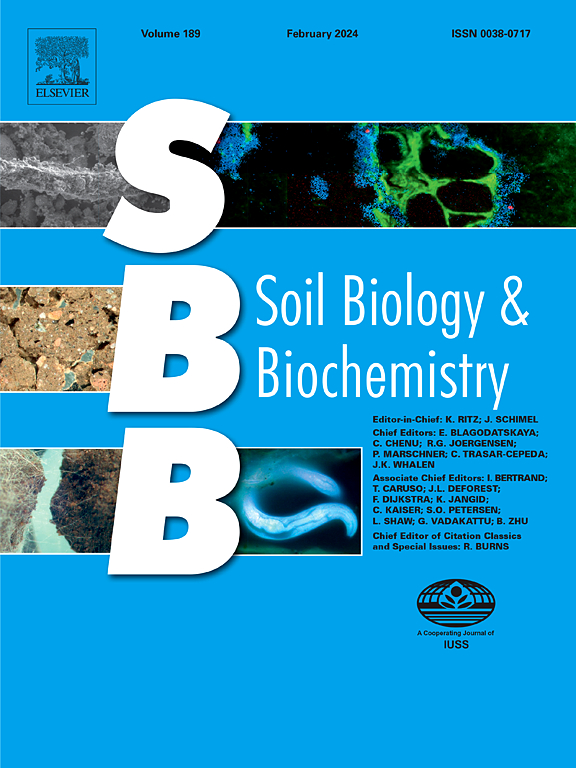Microbial recalcitrant-C metabolism and community composition shifts support enhanced thermal adaptation of soil microbial respiration
IF 10.3
1区 农林科学
Q1 SOIL SCIENCE
引用次数: 0
Abstract
Understanding microbial thermal responses along natural climate gradients is crucial for improving predictions of carbon-climate feedbacks. However, the mechanisms by which variations in microbial carbon metabolic strategies and community composition modulate thermal responses of microbial respiration remain poorly understood. Here, we investigated thermal responses of microbial respiration along an elevational temperature gradient with and without glucose addition, focusing on the roles of microbial carbon metabolic strategies and community composition in shaping microbial thermal responses. Our results revealed that microbial respiration exhibited enhanced adaptation to increasing mean annual temperature (MAT) of the sampling sites, and glucose addition further promoted the magnitude of enhanced thermal adaptation in both surface and subsurface soils. This pattern suggests a positive feedback of microbial carbon decomposition to warming. Metabolism of recalcitrant carbon compounds and enzymatic activities related to recalcitrant carbon oxidation increased with MAT, explaining the largest variation in the enhancement magnitude of microbial respiration. These specific microbial carbon metabolic strategies were linked to microbial carbon availability and shifts in microbial community structure toward oligotrophic microbial strategies. Overall, enhanced thermal adaptation of microbial respiration was associated with increased decomposition of recalcitrant carbon, driven by elevated enzymatic oxidation activity and a microbial community shift toward higher oligotrophic strategists, potentially alleviating microbial substrate limitations. Our findings highlight a mechanism whereby altered microbial carbon metabolic strategies may amplify soil carbon loss by mitigating substrate limitations under warming conditions.
微生物顽固性碳代谢和群落组成变化支持土壤微生物呼吸增强的热适应性
了解微生物沿着自然气候梯度的热响应对于改善碳-气候反馈的预测至关重要。然而,微生物碳代谢策略和群落组成的变化调节微生物呼吸热反应的机制仍然知之甚少。在此,我们研究了在添加和不添加葡萄糖的情况下微生物呼吸在海拔温度梯度上的热响应,重点研究了微生物碳代谢策略和群落组成在形成微生物热响应中的作用。结果表明,微生物呼吸对采样点年平均温度(MAT)的增加表现出增强的适应性,葡萄糖的添加进一步促进了地表和地下土壤的热适应增强程度。这种模式表明微生物碳分解对变暖有正反馈作用。顽固性碳化合物的代谢和与顽固性碳氧化相关的酶活性随着MAT的增加而增加,这解释了微生物呼吸增强幅度的最大变化。这些特定的微生物碳代谢策略与微生物碳有效性和微生物群落结构向少营养微生物策略的转变有关。总的来说,微生物呼吸的热适应性增强与酶氧化活性升高和微生物群落向低营养策略的转变所驱动的顽固碳分解增加有关,这可能减轻微生物底物的限制。我们的研究结果强调了一种机制,即在变暖条件下,改变的微生物碳代谢策略可能通过减轻基质限制来放大土壤碳损失。
本文章由计算机程序翻译,如有差异,请以英文原文为准。
求助全文
约1分钟内获得全文
求助全文
来源期刊

Soil Biology & Biochemistry
农林科学-土壤科学
CiteScore
16.90
自引率
9.30%
发文量
312
审稿时长
49 days
期刊介绍:
Soil Biology & Biochemistry publishes original research articles of international significance focusing on biological processes in soil and their applications to soil and environmental quality. Major topics include the ecology and biochemical processes of soil organisms, their effects on the environment, and interactions with plants. The journal also welcomes state-of-the-art reviews and discussions on contemporary research in soil biology and biochemistry.
 求助内容:
求助内容: 应助结果提醒方式:
应助结果提醒方式:


